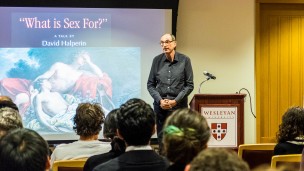
On the surface it would appear that gay bathhouses, Adele’s “Someone Like You,” and Aristotle do not have much in common. Yet University of Michigan W. H. Auden Distinguished University Professor of the History and Theory of Sexuality David Halperin was able to seamlessly connect the three incongruous subjects in his talk titled “What is Sex for?” at the University on Tuesday, Oct. 20.
Assistant Professor of Music Roger Grant was inspired to invite Halperin to the University by the new course he is teaching titled “Queer Opera,” a course that teaches students about opera history through the lens of queer theory.
“The course stages a confrontation between the history of musical aesthetics and the concerns of queer theory, asking what these two domains of thought have to teach each other,” Grant wrote in an email to The Argus. “Halperin is a pioneer in the field of LGBT studies and also an expert on the history of aesthetics—particularly the concerns of form and genre. He also happens to be, among other things, an opera fan, a dear friend, and an important mentor of mine.”
Grant planned the talk with support from The Allbritton Center for the Study of Public Life; the music department; Feminist, Gender, and Sexuality Studies (FGSS); and the Center for Humanities. He hoped the talk would give the University’s entire community a chance to meet Halperin.
“My main aim in planning the talk was to give the entire campus a chance to hear the new work that Halperin is undertaking in the domain of queer love and erotic desire,” Grant wrote. “I was also hoping to give my colleagues and students outside of the Queer Opera class the chance to meet him.”
Halperin began his talk with a story about his quest to find a gay bathhouse in Hanoi, Vietnam, in the summer of 2012. When Halperin finally stumbled upon one, he found it blasting Adele’s “Someone Like You” on repeat. He found this interesting because a gay bathhouse he often frequented in Paris also tended to blast “Someone Like You.” He didn’t think it was a coincidence.
“Why play ‘Someone Like You’ in a gay bathhouse?” Halperin said. “Why play this song about broken hearts, romantic longing, and the search for love in a setting that’s designed not for people looking for love, but looking for sex? Now I don’t know about you, but when I’m in a gay bathhouse, looking for Mr. Right to come along, I am really not. What I’m really looking for is someone sexy; someone who seems like he might be able to offer me a kind of pleasure that I’m seeking. I’m not really looking for someone like you.”
In order to answer the mystery of Adele’s popularity in gay bathhouses around the world, Halperin brought the discussion to Aristotle’s “Prior Analytics.” He proceeded to summarize how Aristotle’s ideas connected to the purpose of sex.
“Aristotle is not making a generalization about people, but a specific observation about the aim of Eros [and] about the aim of passionate love and desire,” Halperin said. “It’s all together quite possible that there might be some people who prefer a boyfriend who put out [rather than] a boyfriend who did not put out, despite being willing in principal to do so. But that’s only because Aristotle implies [it]. People who prefer that aren’t really in love with their objects. They might be turned on by their objects, but they’re not passionately, romantically in love with them.”
With that, Halperin began discussing the idea that sex is not the ultimate goal of erotic desire, bringing it back to the bathhouse and Adele.
“The possibility, however remote, that [individuals think that] once he has sex with me, he will never leave me [and] that I will find someone like you does represent an erotic moment for frequency,” Halperin said. “It may be sentimental, it may be far-fetched, but to judge from the kind of background music often played in the baths, it should not be dismissed.”
Emma Llano ’19, one of the many students who came to hear Halperin speak, enjoyed the talk but took issue with its narrow interpretation of the subject matter.
“I thought it was good, but hard to follow, and very gay, upper class, male-centric,” said Llano. “The title, ‘What is Sex?,’ implied that we were going to talk about sex in its entirety instead of how sex applied to gay males in bathhouses.”
Halperin did, however, conclude his discussion with another question, one different from the one proposed in the title of the event.
“One of love’s most important social functions nowadays is to endow accepted forms of personal life with a look and feel of intrinsic normality,” Halperin said. “But what if erotic love proved to be a lot weirder than sex? The starting point for my current inquiry, as I hope will be clear to you now, is that erotic love takes us in some surprisingly non-normative directions: away from nature, away from common sense, and towards a very queer metaphysics.”


Leave a Reply